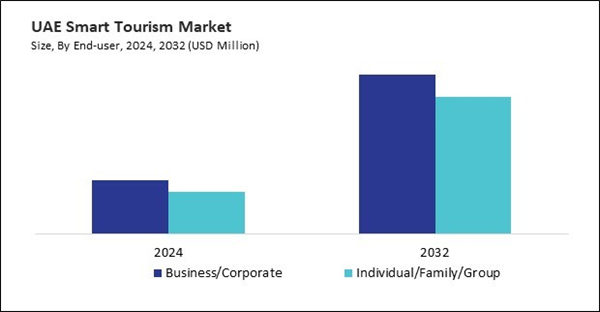The Brazil market dominated the LAMEA Smart Tourism Market by country in 2024, and is expected to continue to be a dominant market till 2032; thereby, achieving a market value of $51 million by 2032. The Argentina market is showcasing a CAGR of 17.3% during 2025-2032. Additionally, the UAE market would register a CAGR of 15.9% during 2025-2032.
Tourists, particularly millennials and Gen Z travellers, are strongly willing to adopt smart travel tools. They are more inclined to use mobile apps, AI-driven chatbots, and AR tools for trip planning and exploration, encouraging further market innovation and adoption. While adoption in developing countries is still in the early stages, it is growing rapidly.
Multiple trends shape the market, reflecting broader technological, social, and environmental changes. AI-powered tools are becoming central to this tourism, especially recommendation systems, chatbot assistance, language translation, and dynamic pricing models. Machine learning enhances service personalization and predictive capabilities.
The market is experiencing significant global growth, driven by rapid digital transformation, government initiatives, and increasing consumer demand for seamless, tech-integrated travel experiences. Countries like Saudi Arabia, the United Arab Emirates (UAE), and Brazil contribute substantially to this trend, each leveraging advancements in technology and infrastructure to boost their smart tourism ecosystems. Strategic investments, policy frameworks, and increasing internet and AI adoption collectively enhance these nations' capability to offer smart, connected, and personalized tourism services. Moreover, Saudi Arabia’s high internet penetration rate - reaching 98.6% in 2022 - demonstrates a solid digital foundation essential for supporting this tourism applications. Consistent annual increases in internet access highlight the country’s commitment to digital inclusivity. This widespread connectivity enables tourists to easily access online services such as digital maps, augmented reality guides, mobile payment platforms, and social media-based travel support. As part of its broader Vision 2030, Saudi Arabia is focusing on diversifying its economy through tourism, and the strong digital infrastructure is a key enabler in offering smart tourism services that cater to the expectations of modern travellers. In conclusion, the synergistic effect of AI integration, digital infrastructure development, and supportive national strategies in Saudi Arabia, the UAE, and Brazil propels the market forward.
List of Key Companies Profiled
- Libelium Comunicaciones Distribuidas S.L.
- Amadeus IT Group, S.A.
- Moca Technologies LLC
- Cleverciti Systems GmbH
- BISMART BUSINESS INTELLIGENCE SPECIALIST SERVICES, S.L.
- Airbnb, Inc.
- Trawex Technologies
- Expedia Group
- Sabre Corporation
- Hopper Inc.
Market Report Segmentation
By End-user
- Business/Corporate
- Individual/Family/Group
By Solution
- Smart Ticketing
- Smart Engagement
- Smart Parking
- Smart Guide
- Smart City Bots
- Other Solution
By Country
- Brazil
- Argentina
- UAE
- Saudi Arabia
- South Africa
- Nigeria
- Rest of LAMEA
Table of Contents
Companies Mentioned
- Libelium Comunicaciones Distribuidas S.L.
- Amadeus IT Group, S.A.
- Moca Technologies LLC
- Cleverciti Systems GmbH
- BISMART BUSINESS INTELLIGENCE SPECIALIST SERVICES, S.L.
- Airbnb, Inc.
- Trawex Technologies
- Expedia Group
- Sabre Corporation
- Hopper Inc.









